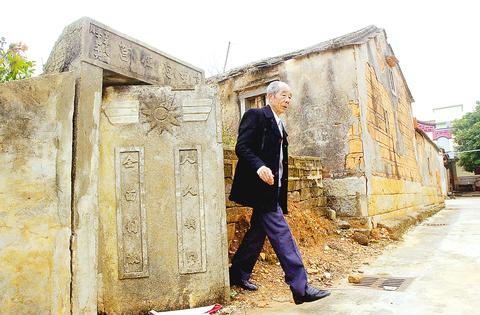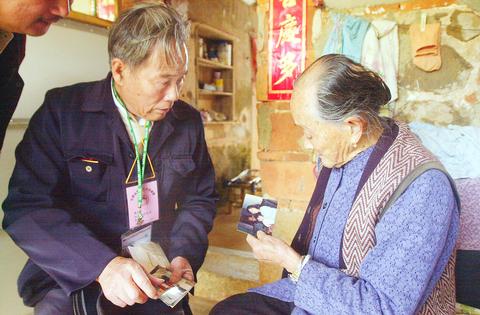A group of senior citizens, all former residents of Kinmen, who returned to Kinmen for the first time in over 50 years on Tuesday, yesterday paid their first visits to their old homes and relatives who have remained on the Taiwan-held islands.
Kinmen is located only 2km off the coast of China and approximately 280km from Taiwan proper. Transportation between Kinmen and Fujian-proper was frequent before 1949. But some Kinmen residents who traveled across into the mainland during the civil war between the KMT and communists were left stranded after the KMT withdrew to Taiwan in 1949.

PHOTO: CHEN CHENG-CHANG, TAIPEI TIMES
Hung You-li (

PHOTO: CHEN CHENG-CHANG, TAIPEI TIMES
Hung Chuen-hui (
"I could hardly recognize the surroundings. They have all changed greatly ? But yes, I know that temple, and that is her house ?" Hong Youli said, looking out of the window of the van on his way to see his sister. He recalled leading his sister to the house during a traditional ceremony following her wedding.
Hung Yuan (
Hung Yuan, looking very weak, met her brother at the house where she lives alone following her husband's death.
"I can't recognize his face. He has grown old, and me too ? We haven't met for almost a lifetime," said the aged woman. She seemed hesitant to engage in conversation with her brother until he mentioned the names of people they both knew -- many of them now dead.
"I have your picture," said Youli, taking out some photographs, before the brother and sister started chatting away about their family.
Youli, unlike other returnees, looked at ease as he visited the sister who could only totter a few steps to see her brother off after the two-hour visit.
"I will take her to stay with the rest of my family in Xiamen," said Youli slowly. Then, after a moment of silence during which he saw his sister wave goodbye while while wiping away tears, the 70-year-old spoke his innermost emotions.
"I can't cry ? otherwise she will shed more tears, which is not good for her health.
Moreover, seeing her cry will make it too difficult to turn my back on her and leave ?"
"I have many concerns ? but I'm also considering moving back to my hometown," Youli said.
"You know, people always feel like clinging to where they were born ?"
Youli married in China, where he now has seven children.
Despite the long separation from his family in Kinmen, Youli was not the most unfortunate of the returnees. Many did not survive for long enough to see their original homes again.
"Your third uncle's wife visited me once in Xiamen a long time ago. I went to her house a few years later but was unable to find her," Youli said to Chuen-hui, as the latter accompanied him during the visit. Youli hadn't known that the woman had been killed during the civil war.
Chuen-huei said his aunt, a very young widow, fell in love with a man who had come from China to Liehyu. Her lover was expelled from Liehyu because the KMT suspected everybody from the mainland of being communist spies.
"She made her decision at the last minute to follow her lover to China. My aunt waded in the waters to catch the sampan that carried her lover back across the water, leaving her daughter for her lover," Chuen-hui said.
"But the man died only a few days after arriving in Xiamen. Having returned from Kinmen, he was suspected by the communists of being a KMT agent and was tortured and died in jail," Chuen-hui said. His aunt also died from an illness shortly afterward.
Hong Zhimin (
"I left for China to study when I was 12. When I was 15, transportation to Kinmen was suddenly cut," Zhimin recalled.
"I had two sisters left in Liehyu. My parents, who were running businesses in Xiamen, and I, were worried about them," Zhimin said with tears in his eyes.
"But we were having trouble taking care of ourselves because of the war. There were soldiers everywhere on the streets. They did not allow us to go out and used to steal from us," he said. "We often ran out of water and food."
"We were unable to hear anything from them until 1989 when they came to visit me. I tried to transfer mail via Singapore but without success, as cross-strait postage was banned then."

Auckland rang in 2026 with a downtown fireworks display launched from New Zealand’s tallest structure, Sky Tower, making it the first major city to greet the new year at a celebration dampened by rain, while crowds in Taipei braved the elements to watch Taipei 101’s display. South Pacific countries are the first to bid farewell to 2025. Clocks struck midnight in Auckland, with a population of 1.7 million, 18 hours before the famous ball was to drop in New York’s Times Square. The five-minute display involved 3,500 fireworks launched from the 240m Sky Tower. Smaller community events were canceled across New Zealand’s

The Ministry of Foreign Affairs (MOFA) yesterday said it is closely monitoring developments in Venezuela, and would continue to cooperate with democratic allies and work together for regional and global security, stability, and prosperity. The remarks came after the US on Saturday launched a series of airstrikes in Venezuela and kidnapped Venezuelan President Nicolas Maduro, who was later flown to New York along with his wife. The pair face US charges related to drug trafficking and alleged cooperation with gangs designated as terrorist organizations. Maduro has denied the allegations. The ministry said that it is closely monitoring the political and economic situation

UNRELENTING: China attempted cyberattacks on Taiwan’s critical infrastructure 2.63 million times per day last year, up from 1.23 million in 2023, the NSB said China’s cyberarmy has long engaged in cyberattacks against Taiwan’s critical infrastructure, employing diverse and evolving tactics, the National Security Bureau (NSB) said yesterday, adding that cyberattacks on critical energy infrastructure last year increased 10-fold compared with the previous year. The NSB yesterday released a report titled Analysis on China’s Cyber Threats to Taiwan’s Critical Infrastructure in 2025, outlining the number of cyberattacks, major tactics and hacker groups. Taiwan’s national intelligence community identified a large number of cybersecurity incidents last year, the bureau said in a statement. China’s cyberarmy last year launched an average of 2.63 million intrusion attempts per day targeting Taiwan’s critical

‘SLICING METHOD’: In the event of a blockade, the China Coast Guard would intercept Taiwanese ships while its navy would seek to deter foreign intervention China’s military drills around Taiwan this week signaled potential strategies to cut the nation off from energy supplies and foreign military assistance, a US think tank report said. The Chinese People’s Liberation Army (PLA) conducted what it called “Justice Mission 2025” exercises from Monday to Tuesday in five maritime zones and airspace around Taiwan, calling them a warning to “Taiwanese independence” forces. In a report released on Wednesday, the Institute for the Study of War said the exercises effectively simulated blocking shipping routes to major port cities, including Kaohsiung, Keelung and Hualien. Taiwan would be highly vulnerable under such a blockade, because it